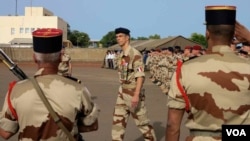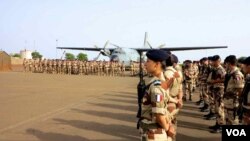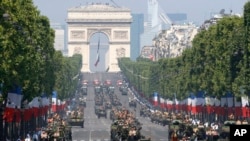BAMAKO —
France’s national day celebration, Bastille Day, was observed in Mali with a parade by French forces Sunday, mirroring the main ceremony in Paris. Stability in the war-torn West African state is improving as French troops deployed on Operation Serval continue to mop up insurgent groups in the north. Speaking to VOA in a rare interview, the commander of French forces, General Grégoire de Saint-Quentin, expressed his optimism about this month’s elections in Mali.
At Bamako air base, French troops gave a somber rendition of their national anthem "La Marseillaise" during their Bastille Day parade - a ceremony that commemorates the emergence of the modern state that grew from the chaos of the French revolution in 1789.
Such historical resonances are not likely to be lost on those senior Malian army officers present. The former French colony saw its government overthrown 16 months ago. A near six-month state of emergency was suspended only last week in anticipation of presidential and legislative elections July 28.
General Grégoire de Saint-Quentin is commanding officer of Operation Serval. The mission by France - at the request of Mali's government - to restore stability and contain Islamist and other insurgents in northern Mali, has been a broad success, with just a handful of French fatalities.
Addressing concerns that the international community is rushing Mali into elections for which it remains ill-prepared, de Saint-Quentin said he is optimistic a functional new government will emerge.
The general said he has no reason to believe otherwise. He said France's efforts in Mali have required some sacrifices, but a consequence is that the elections are actually taking place. He noted that just six months ago when Operation Serval began, two-thirds of Mali had been overrun by terrorists.
A low voter turnout could threaten the credibility of the elections. More than 300,000 Malians are believed to remain displaced by the recent turmoil. Voter registration is also hindered by Mali’s large size and the complexities of introducing a biometric polling system in one of the world’s least developed nations.
However, security is improving and Islamist rebels have been broadly routed by the French, with others fleeing to southern Libya. European forces are now training the Malian army to resume full defense and security duties. General de Saint-Quentin does not preclude targeted French military support if stability is compromised during the elections.
He said judging by the number of voter registrations, Malians are eager to go the the polls. The general expressed hope the elections take place peacefully, noting there have been no terrorist attacks for some time, and that Malian forces have a plan in place to maintain security. He said France is ready to help if Malian forces need any assistance.
Ramping up its stabilization mission (MINUSMA), the United Nations is in the process of deploying 12,600 peacekeepers to Mali, including a significant Chinese contingent. At the same time, Paris intends to reduce its force of 3,200 combat troops to around 1,000 by year-end. France now has a new role to play, observed French ambassador Gilles Huberson.
He said France was there to help in January, and will be there again to help with redevelopment, if Mali wishes. The ambassador says this is the next stage, and Paris has decided the provision of French aid will be entirely transparent and open to scrutiny.
Speaking in Geneva earlier this month, U.N. Secretary-General Ban Ki-moon told reporters the situation in Mali is of grave concern.
“It is vital these elections be credible and peaceful, with an outcome respected by all Malians," he said.
Ban was among the guests of honor of French President Francois Hollande at the main Bastille Day celebration in Paris Sunday, as was Dioncounda Traoré, who, until July 28 at least, remains Mali’s interim president.
At Bamako air base, French troops gave a somber rendition of their national anthem "La Marseillaise" during their Bastille Day parade - a ceremony that commemorates the emergence of the modern state that grew from the chaos of the French revolution in 1789.
Such historical resonances are not likely to be lost on those senior Malian army officers present. The former French colony saw its government overthrown 16 months ago. A near six-month state of emergency was suspended only last week in anticipation of presidential and legislative elections July 28.
General Grégoire de Saint-Quentin is commanding officer of Operation Serval. The mission by France - at the request of Mali's government - to restore stability and contain Islamist and other insurgents in northern Mali, has been a broad success, with just a handful of French fatalities.
Addressing concerns that the international community is rushing Mali into elections for which it remains ill-prepared, de Saint-Quentin said he is optimistic a functional new government will emerge.
The general said he has no reason to believe otherwise. He said France's efforts in Mali have required some sacrifices, but a consequence is that the elections are actually taking place. He noted that just six months ago when Operation Serval began, two-thirds of Mali had been overrun by terrorists.
A low voter turnout could threaten the credibility of the elections. More than 300,000 Malians are believed to remain displaced by the recent turmoil. Voter registration is also hindered by Mali’s large size and the complexities of introducing a biometric polling system in one of the world’s least developed nations.
However, security is improving and Islamist rebels have been broadly routed by the French, with others fleeing to southern Libya. European forces are now training the Malian army to resume full defense and security duties. General de Saint-Quentin does not preclude targeted French military support if stability is compromised during the elections.
He said judging by the number of voter registrations, Malians are eager to go the the polls. The general expressed hope the elections take place peacefully, noting there have been no terrorist attacks for some time, and that Malian forces have a plan in place to maintain security. He said France is ready to help if Malian forces need any assistance.
Ramping up its stabilization mission (MINUSMA), the United Nations is in the process of deploying 12,600 peacekeepers to Mali, including a significant Chinese contingent. At the same time, Paris intends to reduce its force of 3,200 combat troops to around 1,000 by year-end. France now has a new role to play, observed French ambassador Gilles Huberson.
He said France was there to help in January, and will be there again to help with redevelopment, if Mali wishes. The ambassador says this is the next stage, and Paris has decided the provision of French aid will be entirely transparent and open to scrutiny.
Speaking in Geneva earlier this month, U.N. Secretary-General Ban Ki-moon told reporters the situation in Mali is of grave concern.
“It is vital these elections be credible and peaceful, with an outcome respected by all Malians," he said.
Ban was among the guests of honor of French President Francois Hollande at the main Bastille Day celebration in Paris Sunday, as was Dioncounda Traoré, who, until July 28 at least, remains Mali’s interim president.






